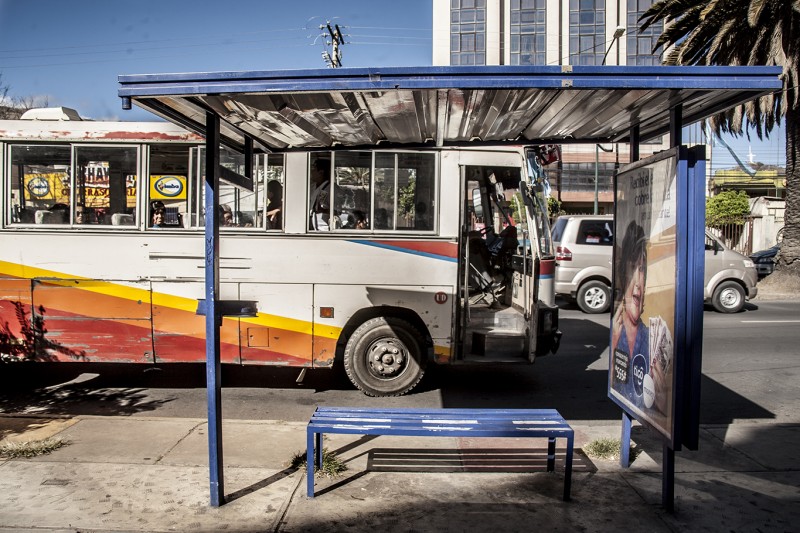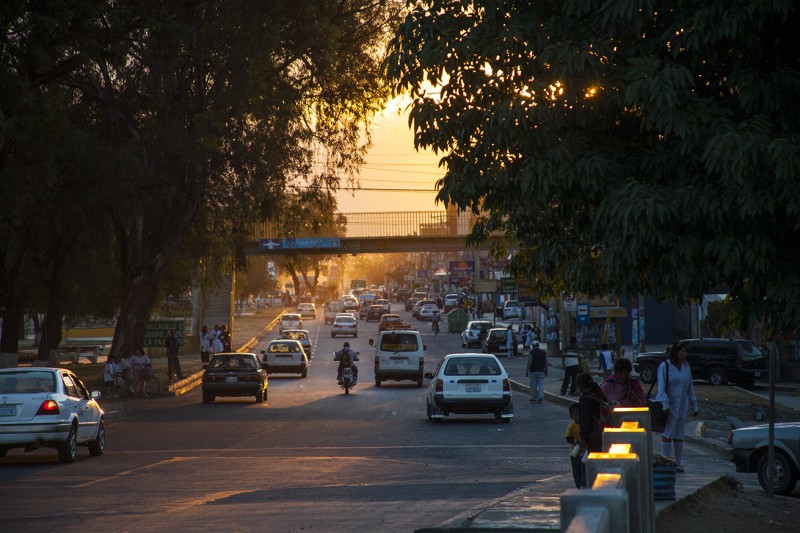
A bus in Cochabamba, Bolivia. Photograph: Mijhail F. Calle Ruiz.
[All links lead to Spanish language web pages].
Public transport drivers in Cochabamba provoked widespread indignation after announcing that the price of a single journey would rise from 1.70 to 2 bolivianos (US $0.25 to US $0.29).
A few hours after the morning newscasts published the news, officials from the Unidad de Tránsito de Cochabamba (Cochabamba Transit Unit), in charge of public transport in Bolivia's fourth largest city, were on the streets making sure that drivers were charging the original price of 1.70 bolivianos. However, immediately after drivers announced the fare increase, locals were expressing their displeasure on social networks. On Facebook, for example, a campaign has been set up in opposition to transport drivers.
The material that has been circulating shows the general discontent towards the public transport service in the city, indicating that locals would be willing to pay more if the service were of a higher standard. Among the demands made by supporters of the campaign are for drivers to:
- Dejar de ver las calles y avenidas como una pista de Fórmula 1 y creerse el gran corredor (más aún cuando se enfrenta a un mismo chofer de la misma línea de transporte). Respetar la velocidad admitida.
- Parar en acera derecha cuando yo le pida que se detenga y no parar a media calle obligándome a bajar con su “allí puedes aprovechar”.
- Detenerse para que suban niños/niñas y personas de la tercera edad. Tratarlos con el respeto que se merecen.
- Quitar de sus micros las fotos de mujeres semidesnudas tomando en cuenta que también viajan niños y niñas en su movilidad.
- Dejar de pensar que su movilidad es una lata de sardina y meter a cuanto pasajero entre bajo el pretexto de “están apurados, quieren entrar también”.
- Stop regarding the streets and avenues as a Formula 1 track and yourself a champion racing driver (especially when you come across another driver on the same route). Respect the speed limit.
- Stop by the side of the road when I ask you to, rather than in the middle of it and telling me to get off there.
- Stop the bus so that children and the elderly can get on. Treat them with the respect that they deserve.
- Remove your pictures of semi-naked women, keeping in mind that children also travel on your bus.
- Stop believing your bus to be a sardine can and letting too many people on under the pretext of “they’re in a rush, they want to get on too”.
The images and messages that locals have been sharing on social networks also allude to the fact that bus drivers do not give the correct change, a problem that has dragged on since the last price increase in 2011. For example, after handing over 2 bolivianos (US $0.29), the drivers ought to give 30 cents (US $0.04) change. However, the lack of 10 cent coins means that the drivers regularly only hand over 20 cents.

Screenshot from the profile page of Ming Rojas, a Facebook user that has been sharing protest material (shared 145 times).
The above chart explains how officials are able, in approximately 10 months, to “steal (…) 8,000 bolivianos or 1,149 dollars by not giving change”. Furthermore, it encourages people to photocopy and distribute the information so that more people join the campaign.
The response to this material has already had repercussions. In addition to commenting on and sharing material, locals have been protesting on their Facebook pages. Jessica Gilda Morales Bellot wrote that:
Como van a exigir si hace poco aumentaron los pasajes y el servicio q dan es pesimo en todo,aumentan asientos improvisados con tal de tener mas pasajeros para cobrar…
How can they demand this when only recently they increased the fares, the service they provide is terrible, they increase the number of make-shift seats so there are more passengers to charge…
Elsequiel Leonardo Martinez wrote:
Pero cuando a alguien le falta 10 cts. esos pelotudos le dicen bajate no?
But when you’re 10 cents short they tell you to get off, eh?
Some on the internet have taken the issue on with a lot of energy, others with responsibility yet still identifying with the protests, whereas others, in different cities around the country, have taken a more humourous approach.

Image taken from the Facebook page of the magazine Lamalapalabra. It has the title: Meanwhile, on a street in La Paz… The above image, which has had 172 likes and been shared 74 times, says: “Push, the traffic light is green, push!!!”
Since the announcement by public transport drivers, Cochabamba residents have thus far been more active protesting on social media than on the streets. Nevertheless, drivers decided to halt services for an indefinite period after they were unable to reach an agreement about the price hike with the authorities.
When considering social network movements it is appropriate to remember the response given by the sociologist Manuel Castells in an interview with the journalist Horacio Bilbao for the Argentine magazine Ñ:
¿Internet puede volver a crear ciudadanos político sociales?
La prueba está en que los movimientos sociales nacen en Internet. Se crean ciudadanos en todo lugar de agregación libre. Y como el único lugar de agregación libre que nos queda es Internet, pues allí están. Pero en cuanto pueden salir a la calle y crear espacios físicos urbanos en los que se tocan los unos a los otros lo hacen, porque somos humanos y el tocarnos es fundamental.
Can the internet create politically and socially minded citizens?
The proof is that social movements are born on the internet. Citizens are made wherever there is free association. And as the only place for free association left to us is the internet, well, that’s where they are. But as soon as they are able to get out onto the street and create urban, physical spaces in which they can touch one another, they do it, because we are human and physical contact is fundamental.

Avenida Blanco Galindo de Cochabamba in Bolivia. Photograph: Mijhail F. Calle Ruiz







